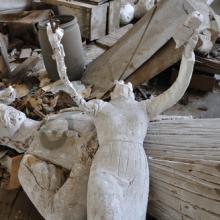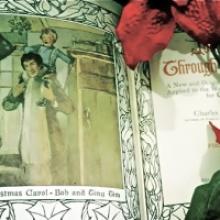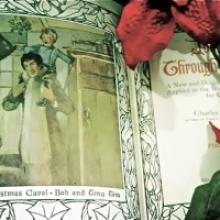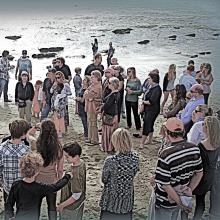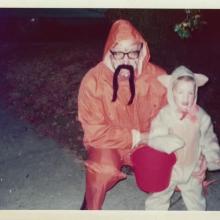Mercy
DANIEL BELL'SThe Economy of Desire juxtaposes Christianity and capitalism, situating both in the context of postmodernity. The main argument of the book is that performing works of mercy—both corporal and spiritual—constitutes an alternative economy that can resist capitalism. Capitalism, in Bell's construal, is an economic system founded on voluntary contracts, private property, and an ideological regime where the rule of the market transcends the rule of law and disregards the reign of God in Christ.
The author draws on the work of philosophers Michel Foucault and Gilles Deleuze to set up a philosophical framework for talking about power and desire. His treatment of Foucaultian insights on the ubiquity of power is meant to decenter the state as the primary engine of social change. Deleuze's work builds on Foucault's argument by conceptualizing people—and society at large—as flows of desire. Taken together, the claim is potentially but not necessarily democratic: Social structures organize desire in particular ways and are malleable due to the fact that power resides not only in the state or market but in the relational networks of everyday people. Under this account, for instance, the typical presidential election is not simply about securing votes, but about directing the aspirations and actions of the electorate toward a collective passion for growing the economy, expanding the middle class, and so on. Capitalism, for Bell, secures our loyalty because it shapes what we do as well as what we desire.
A few strengths of the book stand out. It contains a lucid discussion of the difference between commutative (fair contracts) and distributive (fair proportion of wealth, power, and other goods) justice within society. The scope of the author's analysis is also impressive. Bell substantively engages the arguments of diverse figures from Adam Smith, Milton Friedman, and Friedrich von Hayek to Augustine, Thomas Aquinas, and Martin Luther. Moreover, Bell's contention that proponents of capitalism effectively deny the possibility of social holiness is worth the price of the book.
A Vital Word
In I Told My Soul to Sing: Finding God with Emily Dickinson, Kristin LeMay explores in detail 25 poems as "witnesses" to Dickinson's wrestling with God. LeMay elegantly combines accessible literary analysis with her own spiritual memoir of search, doubt, and faith. Paraclete Press
Blessed Assurance
South African native Jonathan Butler has earned praise in the R&B, contemporary jazz, and gospel music fields. His latest album, Grace and Mercy, offers gentle songs that proclaim faith and hope in the midst of troubled times. Rendezvous Music
Good and gracious God,
Today, like the rest of the world,
when I woke I wrapped myself in myths.
They are comfortable and warming in what can seem like such a cold world.
Yes, they are old and worn but they are familiar
and even the most fashion forward find comfort in this thread-worn garb.
They tell me that while it may not be fair
that 1,600 children die from hunger everyday,
I can do nothing about it.
They silence my own judgment of myself
when I put a quarter in the cup of a homeless man
as I walk on by the lack in his life
to live into the abundance of mine....

Red blood cells. Image via Wylio, http://bit.ly/ysvxWb.
Usually when I hear people talk about finding the good in the midst of a difficult situation, my cynical radar goes up. I picture the scene in Monty Python’s Life of Brian where Brian and the two thieves are being crucified while whistling and singing “Always look on the bright side of life.”
Yeah, right.
I reminds me a girl named Cathy that I knew in high school who already lived on her own before she had even graduated. At school she was the perpetual ray of sunshine, always offering warm smiles and hugs, but hardly concealing a deeper undercurrent of sadness that you could nearly taste.
But once in a while, we have an opportunity to catch a glimpse of grace in the middle of the worst humanity has to offer. And it’s in those moments that I tend to recognize God in our midst.

"Get Together in the Village." Image via Wylio, http://bit.ly/z9esUG.
"You and I have the power to change someone’s day. And so I am going to challenge you, on this Valentine’s Day, to not only tell family members you love them, but also others whom you care for.
"In a world where people are beat up and put down, God gives us the ability to completely turn negativity, criticism and rude opinions around. “Encourage one another and build each other up,” says 1 Thessalonians 5;11. That is one of the most significant verses in all the Bible because when we do this it sets off a chain reaction of blessing.” You become the voice of God’s mercy and grace in the lives of others."

Sign for the confessional at Lourdes. Via Wiki Commons http://bit.ly/s71Wf2
Everybody needs forgiveness.
But it’s hard to face that. It feels threatening, like an accusation. So we tend to get defensive and start justifying ourselves, rather than seeing the one we’ve hurt.
If we’re honest, though, we all know that we’ve done things that have hurt others. Probably lots of things.
It is with death that Dickens begins his story and it is with death that Scrooge completes his journey with the Ghost of Christmas Yet to Come.
Scrooge hears other businessman saying that they wouldn’t attend the funeral unless there was sure to be lunch served. Men for whom he had great business esteem gave no more thought to his death than they did the weather. There were thieves who stripped the clothes off his dead body and the curtains from around his bed.
He begged the Spirit to show him a scene in which some person, any person, was moved to emotion at his death. The Spirit brought him to the house of a debtor who rejoiced with his wife at the death of Scrooge because now they might have time enough to pay back their loan. When he was shown the Cratchit household there was no mention of Scrooge at all, only mourning for the passing of Tiny Tim.
When I imagine Jesus telling his disciples, “Let the little children come to me,” I have a vision of the adults moving aside and Tiny Tim with his crutch crawling into the lap of Christ.
In the scene where Tiny Tim is introduced, his father tells this story of him:
“Somehow, he gets thoughtful, sitting by himself so much, and thinks the strangest things you ever heard. He told me, coming home, that he hoped the people saw him in the church, because he was a cripple, and it might be pleasant to them to remember upon Christmas-day who made lame beggars walk and blind men see.”
It is this child like faith that moves Scrooge to ask the Ghost of Christmas Present if the boy would live to see another Christmas. The spirit answers that he sees an empty chair at the next Cratchit Christmas. Scrooge begs for the future to be changed and the boy spared.
The specter of Jacob Marley entered Scrooge’s room. It had been seven years to the day since Marley died.
Before he sees them, Scrooge hears the clanking of the heavy chains his old business partner now carries with him.
Scrooge asks how it is that Marley became thus fettered.
“I wear the chain I forge in life,” replied the Ghost. “I made it link by link, and yard by yard; I girded it on of my own free-will, and of my own free-will I wore it.”
Marley did not realize in life that he was a slave. He assumed that his wealth and the absence of external restraints meant he was free, when in fact his miserly and selfish ways were forging the means of his own bondage.
There has been a lot of anger levied at the very wealthy since the Occupy movement began back in September. There is no doubt that much of this anger is justified – righteous indignation, if you will.
The ways that people have become extremely wealthy have often been corrupt or immoral, whether or not they are technically "legal." Part of the reason that the Occupy movement sprang up was because people felt that there were different rules for "us and them." People who lost millions of dollars in what was effectively high-stakes gambling were pardoned with little more than a slap on the wrist, while regular families lost everything in a crisis they had no hand in.
As I say, there has been, and still is, much anger. But out of that anger must come something new, something tangible and real.
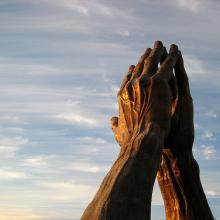
"Praying Hands." Image via Wylio http://bit.ly/smNXdA
This is so horrendous it's almost too awful to type.
Early this morning at a welfare office in Laredo, Texas, a mother, desperate after months of being denied food stamps for her family, pulled a gun and shot her two young children, before killing herself.
To me, "unexpected" is at the heart of how I understand grace. It is the unearnable gift, the divine reversal and sacred surprise, the still small voice that drowns out the din of the maddening crowd, the little bit extra that my Cajun friends call lagniappe, the very thing we "deserve" the least but get anyway. From God. From the One who created the world and the audacious, indescribably power of love.
Taking a cue from Nell, here are just a few of the unexpected blessings I am grateful for today:
For God's fingerprints that cover every inch of our world, seen and unseen. And for the moments where I can almost make out the holy whirls imprinted in the sky, the ocean, the sunlight, and on the faces and stories of each of us.
For the generosity and selflessness I see so vividly — all around me, all the time — even in these lean, nervous days. I saw it in Zuccotti Park, where strangers prepared and served food to other strangers. I saw it in the sober faces and strong arms of the men who helped 84-year-old Dorli Rainey to safety after she was pepper-sprayed at an Occupy rally in Seattle. I heard it in the prayers lifted at the White House, at North Park University in Chicago, and in the basement of a church in Spanish Harlem where kind, mighty souls formed Human Circles of Protection last week and stood in solidarity with the poor, the vulnerable, and the least of those among us. I watched it on display at border crossings, immigration rallies, refugee camps in the Horn of Africa, and at a glass blower's studio in my hometown of Laguna Beach where strangers arrived with shovels and wheelbarrows to help dig out an artist and his artwork from the muddy ravages of a flash flood. I saw it in the fresh coat of paint on the front steps of my elderly parents' home in Connecticut that my cousins had applied for them with great care and kindness when my brother and I couldn't be there to do it.
Late Friday afternoon, UC Davis campus minister, the Rev. Kristin Stoneking, was in the car driving with her family from Davis to the American Academy of Religion gathering in San Francisco when she received a phone call from a campus administrator. Katehi was "trapped" inside her office at the university administration building, where a large crowd of protesters had gathered outside, flanking both sides of the sidewalk in front of the building's entrance. The chancellor was afraid to leave on her own and asked Stoneking to come mediate her exit with students.
Stoneking was running late, having missed a few of the AAR's sessions already, and was reluctant to heed the call. She called one of the students involved in organizing the Occupy protests on campus and learned that, "students were surrounding the building but had committed to a peaceful, silent exit for those inside and had created a clear walkway to the street." So she turned the car around and drove back to the university.
"Why did I walk the Chancellor to her car? Because I believe in the humanity of all persons," Stoneking writes. "Because I believe that people should be assisted when they are afraid. Because I believe that in showing compassion we embrace a nonviolent way of life that emanates to those whom we refuse to see as enemies and in turn leads to the change that we all seek. I am well aware that my actions were looked on with suspicion by some tonight, but I trust that those seeking a nonviolent solution will know that 'just means lead to just ends' and my actions offered dignity not harm."
This is true of any bad news, really. When I feel sick. When I don’t get my way. When I’ve had a bad day. You name it. If it’s negative, then I look forward to sharing it. I don’t mean to; I just do.
I sense this is normal, but it doesn’t make it right.
The Sunday, Nov. 13 lectionary gospel is Jesus’ Parable of the Talents (Matthew 25:14-30).
Kari Jo Verhulst, in Sojourners, reflected on Jesus’ challenging teaching: “The point is not to perfect our particular gifts, or ourselves, but to quit hoarding ourselves from others, and instead step out in faith that we have been given all we need.”
The following new hymn affirms that Jesus’ parable calls us to faithfulness even when it involves risk and challenge today.
O God, we yearn for safety; We long to be secure.
Yet faithful, loving service Is what you value more.
You give us what is needed; You love, forgive and save.
Then, sending us to serve you, You call us to be brave.
You give to some ten talents—to others, two or three;
To some you give one blessing To manage faithfully. ...
One of my most vivid childhood memories of Halloween 1977, the year my family moved to a new town in Connecticut right after the school year had begun. I don't recall what my costume was, but I do remember going door-to-door with my father, meeting new neighbors and collecting a heavy bag of candy, as the suburban warren of Cape Cods and manicured lawns morphed into an other-worldly fairyland.
I was 7 years old and the new kid on the block, so when the cover of darkness fell at sunset, I hadn't a clue where I was. As my father deftly navigated our way home in the crisp autumn night, it felt like he had performed a magic trick. When the morning came, I couldn't believe that our adventure the night before had been on these same streets. To my young imagination (and heart) it felt as if we had been walking through Narnia or Rivendell rather than a sleepy New England suburb.
A few years after that, my family stopped celebrating Halloween. We had become born-again Christians and our Southern Baptist church frowned on the practice. Halloween, I was taught, was an occult holiday (or maybe even Satanic!) and good Christians should have nothing to do with it.
Churches play the unique role of seeing the big picture. We can call out the values and virtues of the issues. Let's not just worry about the poor in our own communities, but the poor everywhere, the people everywhere who are struggling. We can't be private anymore. We must be living water for all people.
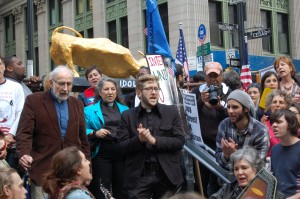 People everywhere are leaving their private spaces and gathering together -- that's already church. This is a Holy Spirit moment.
People everywhere are leaving their private spaces and gathering together -- that's already church. This is a Holy Spirit moment.
Visit msnbc.com for breaking news, world news, and news about the economy
Where is the compassion in our economy and our politics? It says much of the economic system that Sojourners even needs to campaign for a "moral budget." How do we, as Christians, challenge structures that allow billions of dollars to be wasted via tax loopholes while 1 in 6 Americans live in poverty?
Will we, as Sachs hopes,
A truck bomb has killed at least 70 people in the Somali capital of Mogadishu, including a crowd of young students applying for scholarships to study abroad.
